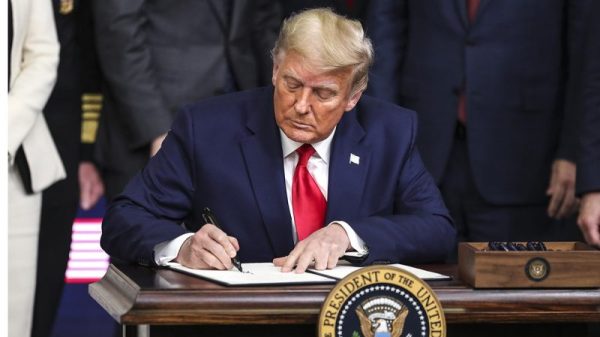Polling suggests that the issue has broad support both nationally and in individual states. But action is unlikely; opposition from the right will see to that. In fact, the imbalance in power between the two parties is fundamentally why the situation looks the way it does.
True of passing a federal law protecting access to abortion. True of efforts to regulate access to firearms.
On Thursday, the White House announced that it would expand the number of background checks conducted before firearm sales by expanding the universe of sellers for whom such checks are required. It is, inescapably, a workaround — a means of increasing scrutiny of gun sales without needing Congress to pass legislation with that focus.
Because no such legislation would pass. In the wake of the massacre at an elementary school in Newtown, Conn., in 2012, President Barack Obama pushed for an expansion of regulations on gun purchases. A bipartisan bill was presented to the Senate … and blocked by a filibuster.
The Biden administration’s effort to expand background checks now follows a law passed last year that was one of the largest expansions of gun-control measures in decades. Even that bill, though, was incremental, tweaking rules to ensure oversight of more transactions and expanding prohibitions against ownership for people convicted of domestic violence or otherwise deemed dangerous.
Universal background checks in particular have seen consistent and long-standing public support. Last year, Quinnipiac University found that nearly 6 in 10 Americans support stricter gun laws — but more than 9 in 10 support universal background checks before gun sales. Majorities also supported a ban on assault-style weapons and high-capacity ammunition magazines.
No one, though, says this public support will translate into policy for the simple reason that there exists a vocal, energetic minority that would energetically fight any new restrictions — or, perhaps, that Republican officials in particular would fight new restrictions. It is and has been Republicans who have blocked new gun legislation because the Americans who most fervently believe in unfettered access to firearms are overwhelmingly Republican.
In 2013, 54 senators wanted to move forward with an amendment that would expand background checks. Four of them were Republicans. Collectively, those 54 senators represented more than 60 percent of the U.S. population. A majority of the votes cast for senators had been cast for members of the Democratic caucus. But none of that was enough for the proposal to move forward.
A Washington Post-ABC News poll conducted that same month found that 86 percent of Americans supported an expansion of background checks. Three-quarters of Americans — and two-thirds of Republicans — supported the idea strongly.
Opponents of expanding gun-control measures point to the Second Amendment and often to the Supreme Court’s decisions, particularly in recent years, bolstering the right to gun ownership. The court, of course, is also why numerous states are now restricting access to abortion.
A similar pattern of manifested minority power led to the repeal of Roe v. Wade. Then-Senate Majority Leader Mitch McConnell (R-Ky.) declined to hold hearings to confirm Obama’s nominee to fill the Supreme Court seat vacated by the death of Antonin Scalia in 2016. (As in 2013, Senate Republicans represented less than half the country and had collectively been elected by less than half the votes cast for sitting senators.) The seat remained open when Donald Trump won the presidency that November — with a loss in the popular vote but a win in the electoral one.
Trump, who had pledged to appoint justices who would overturn Roe, appointed three justices who did exactly that.
Access to abortion, too, is broadly popular. In most states, PRRI polling found that most people believed abortion should be legal in most or all cases.
Last month, Fox News polling found that a majority of Americans — nearly two-thirds — supported the passage of a law protecting abortion nationally.
It’s unlikely to happen. The Senate is narrowly divided between the two parties; it is exceedingly unlikely that enough Republicans would support codifying abortion nationally to overcome a filibuster. After all, Republicans are more likely than most Americans to oppose such legislation, even though 4 in 10 Republicans support the idea. And that’s just the Senate. Republicans control the House.
At the state level, affecting change is similarly tricky, as The Washington Post’s Aaron Blake wrote Thursday. In Arizona, the state Supreme Court — expanded in 2016 to allow a conservative majority — ruled this week that a near-total ban on abortion that dates from 1864 should be enforceable. In PRRI’s poll last year, 6 in 10 Arizonans said abortion should be legal in all or most cases. The state’s House and Senate, though, have narrow Republican majorities that have already taken steps to block efforts to repeal the bill. In Florida, meanwhile, a strict prohibition in the state will be tested by a November ballot measure protecting abortion access — but the measure requires a 60 percent majority to pass.
One of the long-standing challenges for advocates of abortion access, like advocates of gun control, has been that the other side’s voters have often been more motivated to vote on the issue than they have. That pattern on abortion may have been broken since Roe was overturned; ballot measures and races centered on abortion have consistently gone for the pro-access position since Roe fell.
But now those seeking to restrict access to abortion have a different advantage: the status quo. And as fights over background checks have shown, it is much harder to challenge the status quo when your opponents are backstopped by the disproportionate power often awarded to the Republican minority.






































